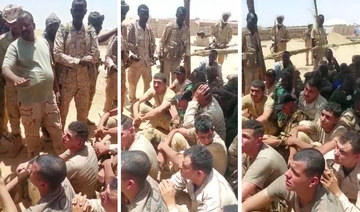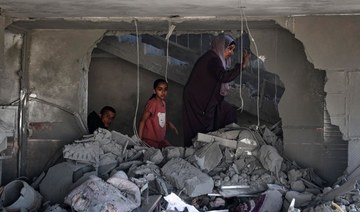KHARTOUM: Sudan’s army chief branded a powerful paramilitary force battling the army as a rebel group on Monday, in a deadly power struggle that has derailed a shift to civilian rule, led to UN calls to stop fighting and raised fears of a wider conflict.
The rupture between the army and the paramilitary Rapid Support Forces (RSF) has killed at least 97 civilians and 45 soldiers according to a medics’ group, with airstrikes and fighting in the capital and strife spilling across Sudan.
Both sides claimed they made gains on Monday as smoke hung over the capital Khartoum and residents reported a clamour of airstrikes, artillery fire and shooting that cut off basic services and damaged hospitals in a city unused to violence.
Television images from the international airport inside the city showed a raging fire with plumes of black smoke, and satellite images showed damaged planes.
The fighting in Khartoum and its adjoining sister cities of Omdurman and Bahri since Saturday is the worst in decades and risks tearing Sudan between two military factions that had shared power during a rocky political transition.
Army chief General Abdel Fattah Al-Burhan heads a ruling council installed after a 2021 coup and the 2019 ousting of veteran leader Omar Bashir during mass protests. RSF leader General Mohamed Hamdan Dagalo, known as Hemedti, is his deputy.
Under an internationally backed transition plan, the RSF was shortly due to merge with the army. Burhan on Monday ordered the group to be dissolved as the two sides exchanged bitter accusations.
In comments to Sky News, Burhan said he was secure in a presidential guesthouse within the defense ministry compound. He said his goal was to defeat the RSF, but did not rule out some form of negotiation.
“Every war ends at the negotiation table even if the opponent is defeated,” Burhan said.
RSF leader Hemedti, whose whereabouts since Saturday are unknown, called for the international community to take action against what he called Burhan’s crimes. In a tweet, he called the army chief “a radical Islamist who is bombing civilians from the air.”
Continued violence could destabilize a volatile region and play into competition for influence there between Russia and the United States, and between regional powers who have courted different actors in Sudan.
Egypt, which has long been wary of political change in Khartoum, is the most important backer of Sudan’s armed forces. Hemedti has cultivated ties with several foreign powers including Russia.
There was no sign on Monday that either side was willing to back down. While the army is larger, and has air power, the RSF is widely deployed inside neighborhoods of Khartoum and other cities, making it hard for either side to secure a quick victory.
Fighting between the sides in Darfur has meanwhile raised the spectre of renewed conflict in the western region that from 2003 was plagued by years of bloody warfare that killed as many as 300,000 people and displaced 2.7 million.
Hospitals damaged
Offices, schools and petrol stations in the capital were shut on Monday, while health services were widely disrupted and four major hospitals said they had been damaged and two were out of action due to the clashes.
The bridges linking Khartoum with Omdurman and Bahri across the Nile River’s two main branches were blocked by armored vehicles and some roads leading from the capital were impassable.
With water and power services also cut across large parts of the capital, some residents were venturing out to buy food, forming long queues at bakeries.
There has been no police presence on the streets of Khartoum since Saturday and witnesses reported cases of looting.
“We’re scared our store will be looted because there’s no sense of security,” said Abdalsalam Yassin, 33, a shopkeeper who had bought in extra stock ahead of the coming Eid Al-Fitr Holiday.
UN chief Antonio Guterres condemned the outbreak of fighting and urged a return to calm, saying an already precarious humanitarian situation was now catastrophic.
The RSF claimed it had captured an airport and military bases, while the military said it was in control of its headquarters despite what it called “limited clashes” in the vicinity. Reuters verified video showing RSF forces in some of those locations but could not verify battlefield claims.
The army regained control of the main television station, which briefly went off air after gunfire was heard during a live broadcast. The station began broadcasting videos showing the army destroying RSF vehicles, a day after the RSF said it had taken over the building.
Power struggle
The eruption of fighting over the weekend followed rising tensions over the RSF’s integration into the military.
Discord over the timetable for that process delayed the signing of the framework framework deal to launch a civilian transition that was due to be signed earlier this month.
It comes four years after Bashir was toppled, and nearly two years after a military coup.
US Secretary of State Antony Blinken said an immediate cease-fire was needed and that the fighting potentially posed a threat to the wider region. Germany called on both sides to de-escalate.
In Darfur, residents said fighting continued. “It’s calmer than yesterday but there was heavy artillery in the morning,” said Mohamed, a doctor in El Fasher in North Darfur.
In Nyala, the region’s biggest city, a member of a monitoring group said people were terrified. “We see men on motorcycles and they have been going into people’s homes, stealing cars, going into buildings, and going into NGOs and looting,” he said.






















